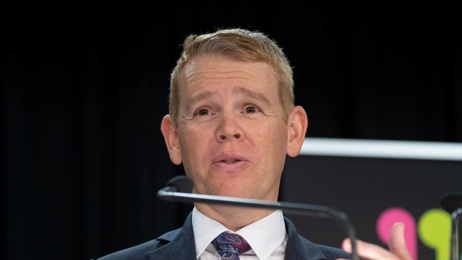
It was not the week Chris Hipkins was hoping for.
He and his MPs made their annual pilgrimage to Wairarapa on Thursday for Labour’s caucus retreat.
Its theme was meant to be one of rebuilding; instead, a major focus was on a series of critical errors the party had made around finance.
The first was a somewhat familiar subject.
On Tuesday, Labour opened its war chest of attack lines and pulled out an old reliable: the fiscal hole.
Former finance minister Grant Robertson knows just how effective this political strategy can be. Ahead of the 2017 election, he was forced on the defensive by National after accusations of an $11.7 billion fiscal hole in Labour’s books.
Despite a valiant attempt to disprove the notion, the damage was done and Labour took a poll hit as then-Finance Minister Steven Joyce waxed lyrical about Labour’s inability to balance its books.
Robertson had the last laugh some weeks later, however, after Labour won the election and he took Joyce’s job.
But Robertson’s real revenge would come three years later, when he pulled the same moves on National ahead of the 2020 Election.
This time, National conceded it did have a $3.9b gap in its budget, because of double counting in its transport policy.
It’s no surprise then, that in a bid to replicate some of the successes of her predecessor, new finance spokesperson Barbara Edmonds drew from the same, once-rich well.
But her attempt was shot down at the first hurdle.
The alleged $90 million “book-keeping blow-out" was a complete fizzer.
According to Edmonds and revenue spokeswoman Deborah Russell, the Government’s interest deductibility policy, whereby landlords receive an effective tax cut, would cost the Government zero dollars this financial year.
This is despite the policy kicking in from April 1 – three months ahead of the end of the financial year – meaning, according to Edmonds, there was an unaccounted-for three-month gap, which represents a $90 million shortfall.
Only, there wasn’t.
Revenue Minister David Seymour could barely contain his glee when pointing out the Government’s costings are done based on when a person’s tax return is filed with Inland Revenue.
The April tax returns won’t be received until well into the 2024/25 fiscal year, meaning there is no cost in this financial year.
Swing and a miss number one from Labour – and we didn’t have to wait long for number two.
In a press release published over the weekend, Edmonds claimed the interest deductibility policy would give approximately 346 landlords who own at least 200 properties each around $464 million between them.
The calculations were made using bond lodgement data, but Official Information Act data shows that of the 346 “landlords” who “own” 200+ properties, 345 are registered property managers: ie, someone who works at an agency that looks after houses for clients.
Just one person in the country outright owns more than 200 homes and will become a “tax-cut millionaire”.
Another whopper.
These errors erode trust in Labour’s new face of finance – meaning journalists will take any future fiscal attacks with a grain of salt.
And in a world where Labour’s desperate for coverage and yearning to score hits on the Government, this is a very bad start.
The saga shows how much of a gap Robertson will leave in the party when he departs politics next week.
It’s hard to think of a scenario where just one of these errors would be made while he was at the helm of Labour’s finance ship.
Two in the space of a week is simply inconceivable.
Labour has a lot of work to do to rebuild after last year’s devastating election loss and there is still a lot of time before the next election.
But a spattering of ill thought-through, incorrect and inconceivable errors has illustrated that the post-Robertson era for the Labour party is going to be a tumultuous time.
Take your Radio, Podcasts and Music with you









